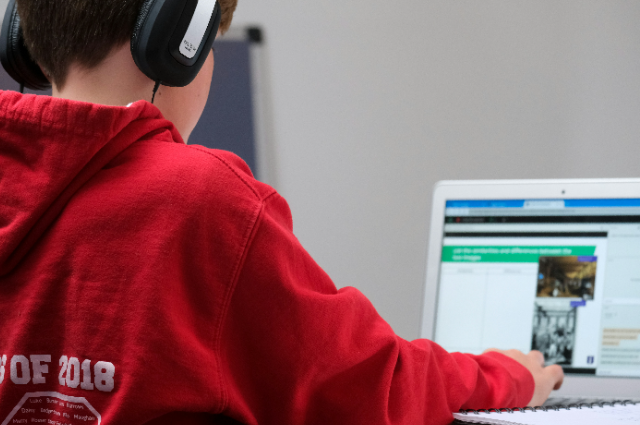
Photo by Compare Fibre on Unsplash
Introduction
Our government spends a huge amount of money around one lakh and fifty thousand crore rupees every year for educating the youngsters. More than half of the money is being spent on Teachers' salaries. A hefty sum of money will be saved and it can be used for a lot of developmental projects, which may improve the economic status of people.
Advantages of Online Education
The teaching-learning process will not cost much if we use online platforms. Students can attend online classes from anywhere they want. Our state government has already been giving laptops to the students. Such schemes are the basis for establishing online schools. Nowadays children learn language and culture from social media platforms. Many candidates have been passing their competitive exams only by observing YouTube videos; which proves that classroom education is not always the ultimate method. Online learning is the easiest and safest method as well.
As the American writer Isaac Asimov has written that in the next hundred years, there will be no building schools and children will be learning their lessons on computers, being at home. What he wrote in his essay, just happened during the coronavirus pandemic period. Creative writers are like prophets. They think and care for the society. So whatever the ideas which benefit the country, should be considered.
When the children stay at home and attend their classes online, their family members also acknowledge the present scenario of the field of education and a real group study takes place in the family by the way. Philosophers say that family members should sit together and eat their meal at least once in a day to nurture the family relationship; similarly, if they learn together, the family will become a place of embodiment of knowledge. In the world of technology, people learn even martial arts through the internet. The arts such as yoga, singing and dancing are being learnt by people through video conferences. So, online education will be a successful process. Students prefer a comfortable way to acquire knowledge. During the coronavirus pandemic, online learning became very effective in many ways.
Complications and Clarifications
If we conduct schools online, poor children who enjoy the midday meal at school will suffer; for which the government has to have a plan for a regular income, by which the family members will be able to manage themselves. Instead of giving the people only alms, we have to let them use their own arms, by giving them a chance to do the job they deserve.
Some people argue that electronic gadgets may distract the students from learning. The truth is even in school and college classrooms, students can't hold their attention on a particular thing for more than thirty minutes says a psychological survey. Therefore distractions prevail everywhere and it is inevitable. The amount which our government spends on uniforms, transport, paper books and stationary items can be saved. As our government has already made electricity available even in rural areas, power supply won't be a barrier. Only for the signal issues, some necessary steps will have to be taken and such hurdles can be sorted out in no time.
The network slicing for uninterrupted internet connection has to be done, which will allow the children to learn from their residences. Conducting exams will not be a big task as online proctoring software is being used. When students attend their exams using the software, it recognises the candidates and ensures that they share the screen and audio of their devices. Such methods will let the scholars write their exams genuinely and honestly.
To take up the initiative, we can think of implementing online education in colleges first. These days, universities have been conducting exams online, having various remote proctoring software, which prevents malpractices of candidates and it has already become a profitable method. Faculties who are already qualified by passing the eligibility exams can only be recruited and used seniority-wise based on the workload in the Department of Education.
Many developed countries have allowed and opted for online schools and colleges as it is less expensive. The government has to aware educators and graduates about stipend and loan schemes in order to encourage self-employment. The government always prefer temporary guest lecturers for teaching, in order to make up for the lack of professors. What do the authorities think is, rather than appointing one permanent teaching faculty, paying them lakhs of rupees as salary every month, they can appoint five assistant professors. In that way, one permanent faculty's pay scale is equal to five temporary faculties’ salary and there won't be a big difference in the work done by both permanent and temporary faculties. So, the ministers handle the financial crisis skillfully by appointing only guest lectures in colleges.
Many college students do part-time jobs in order to support their families financially. In all the fields, human beings have been replaced by machines. A lot of illiterates and marginal people, who don't have good earnings, have gone for substitution jobs. So, there is nothing to worry about in letting the excessive employees go for an alternate source of income. Superfluous teachers of both schools and colleges can be used for many administrative works as they are already being utilised for election duties and many government surveys. Almost in all the fields, where workers used to get paid a meagre wage, alternate methods have come and every place has been mechanised.
Conclusion
Criticism and opposition are usual to happen when new things are implemented. Considering the benefits of society, we have to execute the necessary things and move on. Wonders will happen in the field of education if we shift from face-to-face learning to virtual learning.
. . .
Reference:
- The Fun They Had by Isaac Asimov
